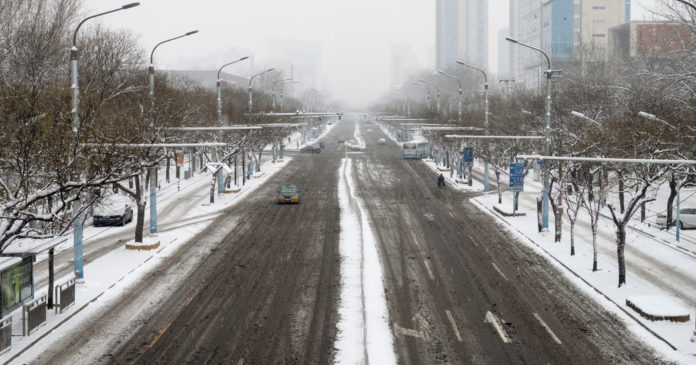An American has died from the coronavirus in Wuhan.
A United States citizen has died from the new coronavirus in Wuhan, China, in what appeared to be the first death of an American from the outbreak.
Few details about the American, who died on Thursday, were immediately available. The person was around 60 years old and died at Jinyintan Hospital in Wuhan, according to the United States Embassy in Beijing. Two people familiar with the matter said the person was a woman and had underlying health conditions.
“We offer our sincerest condolences to the family on their loss,” said a spokesman for the embassy. “Out of respect for the family’s privacy, we have no further comment.”
Japan also said on Saturday that one of its citizens had died in a Wuhan hospital, from what was suspected to be a case of the coronavirus. But the Japanese Foreign Ministry said that based on information it had received from the Chinese authorities, it could not confirm whether the man, who was in his 60s, had been infected with the virus. The ministry said the cause of death was viral pneumonia.
Car factories are idling in China, raising global concerns.
Chinese car and auto-parts factories may stay closed longer than expected because of the coronavirus, increasing the chances that assembly lines in Asia, Europe and the United States could grind to a halt because of shortages of components.
Several automakers including BMW, PSA and Toyota have delayed restarting their assembly lines in China by another week, and others appear likely to follow suit. Even a relatively brief interruption in the flow of parts and materials could have far-reaching effects, analysts said.
The shutdowns at Chinese factories have hit automakers from several angles. The virus is already causing them to lose sales in China, the world’s largest car market by far. If they are forced to shut down factories outside of China because of parts shortages, as Hyundai has already done in South Korea, they could also lose sales in other regions.
The blow to the auto industry, which employs eight million people worldwide, comes at a time when output from the world’s factories is already sagging. It is likely to amplify the human and economic cost of the outbreak.
A city’s plan for getting people to the doctor: Don’t let them buy medicine.
Hangzhou, a Chinese city with a population of 10 million, said it would temporarily ban the sale of flu and cough medicine at pharmacies, in an effort to compel people who might be sick to see a doctor.
In a statement, which was issued at midnight Friday and took effect immediately, the local government said the policy was created to “strengthen the supervision of those with fevers and coughs.”
To stop the spread of the coronavirus, the Chinese authorities have taken increasingly draconian measures to curb travel, impose social distancing and track those who might be sick. Several cities in the eastern province of Zhejiang, including some sections of Hangzhou, have set limits on how often people can leave their houses, generally allowing one person to leave every few days to buy groceries. Paper passports have been printed to keep tabs on residents.
As such restrictions have increased, so have people’s fears about being suspected to have the virus. Some have complained that hotels set up for quarantines do little to separate people who are already sick from those who have no symptoms, but who are from an area that experienced an outbreak. In recent weeks, several articles in Chinese news media have told of people who used medicine to suppress coronavirus symptoms in order to get through the country’s now ubiquitous fever-screening checkpoints.
Online, many people vented frustration about Hangzhou’s ban on medicine sales, though some said it was a good way to identify cases of the coronavirus that otherwise might not surface.
“Good, I strongly support this,” wrote one user, calling for the elimination of “every possible loophole that could spread the virus.”
Some wondered what those with chronic illnesses were supposed to do if they couldn’t get medicine they needed to relieve their symptoms. Others worried that the policy would speed the spread of the virus by forcing many more people to go to hospitals, where some carriers of the virus would likely be. Many have been alarmed by images from Wuhan of packed hospital waiting areas.
“Going to the hospital for a regular cold?” wrote one skeptical user. “What if you go to the hospital and get infected?”
Hong Kong, a wounded city, sustains another blow.
Hong Kong had already suffered through months of political protests. Its economy is shrinking, and mistrust divides its people from its leaders.
Now the coronavirus is dealing Hong Kong, Asia’s financial capital, another devastating blow. Airlines are cutting service. Schools are closed. Panicked residents are hoarding rice, face masks and — in the latest run — toilet paper.
In the air is a new emotion for a city where the glimmering skyline once seemed to promise riches and opportunity: fear.
“We don’t know when it will end or how much worse it will get,” said Amber Suen, a flight attendant with Cathay Pacific, the beleaguered Hong Kong airline that on Wednesday asked its 27,000 employees to take three-week unpaid furloughs to save money.
The new coronavirus, which has killed hundreds and sickened thousands in mainland China, has been much less prevalent in Hong Kong. One person has died and at least 25 have been infected, mostly while traveling in the mainland. Its hospitals are respected around the world.
The world is not drawing a distinction, however, in part because the city has tightened but not fully closed the border with the mainland.
The multinational companies that helped make the city global are restricting travel there. Some are advising or requiring returning employees to quarantine themselves. And getting to Hong Kong is becoming increasingly difficult. Virgin Australia joined United Airlines and American Airlines in cutting service. Italy has suspended flights from Hong Kong, while the Philippines and Taiwan are requiring arrivals to go into quarantine.
Deaths in China reach 722, and infections climb past 34,000.
The death toll and the number of infections have grown again, according to official data released early Saturday.
Across China, 86 new deaths and 3,399 new cases emerged in the previous 24 hours, the national health authorities said.
The new figures brought the total number of deaths in China to at least 722. And the total number of confirmed cases rose to 34,546.
Most of the newly reported deaths, 81, occurred in Hubei Province, the heart of the outbreak.
Many doctors believe that deaths and infections in China are undercounted because hospitals and laboratories are under severe strain to test for the virus.
The Communist Party sends high-ranking officials to the epicenter.
China’s ruling Communist Party sent two senior officials to Wuhan to reinforce efforts to bring the coronavirus outbreak under control, amid rising public anger over the handling of the crisis.
State media reported on Saturday that a deputy head of the National Health Commission, Weng Hesheng, and the general secretary of the Central Political and Legal Affairs Commission, Chen Yixin, would take charge of the fight to contain the epidemic in Hubei Province, where Wuhan is situated.
It was not immediately clear if the appointments amounted to a reshuffling of the provincial and city leadership or were simply an effort to reinforce officials on the front line. Still, it appeared to be an acknowledgment that the authorities in Wuhan have been overwhelmed as deaths and infections continue to soar.
Mr. Chen was previously party secretary in Wuhan and deputy party secretary for the entire province. Mr. Weng has held a variety of positions overseeing public health and family planning in the city of Tianjin and, since 2016, on the national level.
The appointments came a day after the State Supervisory Committee, a powerful anticorruption body, announced that it would send a team to investigate the circumstances surrounding the death of a Wuhan doctor, Li Wenliang. Dr. Li was punished by health officials and the police for privately warning colleagues in December about the mysterious new illness that was appearing in Wuhan’s hospitals.
It is rare for the party to react directly to public pressure, but Dr. Li’s death provoked such an outpouring of public anger and grief that it appeared to force the party’s hand.
Travel to Asia slows, even to destinations far from China.
Travelers to Asia, even to countries far from the epicenter of the virus in China, are beginning to reconsider their plans.
Hard data on cancellations is scarce, as airlines, hotels and travel boards say they do not yet have numbers or will not share them. But tour operators, travel insurance brokers and airline employees say they are facing growing numbers of customers changing their plans.
Brian Fitzgerald, president of Overseas Adventure Travel, a company providing group tours to travelers mostly over 50, said it encountered cancellations to China through April in the wake of the outbreak’s announcement. But this week, he said, tourists scheduled to go to Laos, Cambodia and Vietnam were reconsidering as well.
January data from April Travel Protection, an insurance provider, which tracks residents in the United States traveling to every country in the world, shows that claims with an Asian country in the itinerary more than doubled compared to January 2019.
More than 20 international carriers have suspended or restricted routes that ended in Wuhan and other major Chinese cities, including Beijing, Hong Kong and Shanghai.
Overwhelmed by flu, U.S. hospitals fear coronavirus will be next.
With an intense flu season in full swing, hundreds of thousands of coughing and feverish patients have already overwhelmed emergency rooms around the United States. Now, hospitals are bracing for a potential spread of coronavirus that could bring another surge of patients.
So far, only a dozen people in the United States have become infected with the coronavirus, but an outbreak could severely strain the nation’s hospitals.
“We’re talking about the possibility of a double flu pandemic,” in which a second wave starts before the first is over, said Dr. Eric Toner, a senior scholar at the Johns Hopkins Center for Health Security.
Public health experts are also closely watching reserves of vital medical supplies and medications, many of which are made in China. Some hospitals in the United States are already “critically low” on respirator masks, according to Premier Inc., which secures medical supplies and equipment on behalf of hospitals and health systems.
“All the hospitals are taxed with a large flu season and other bugs,” said Dr. Mark Jarrett, the chief quality officer for Northwell Health, which operates 23 hospitals across Long Island and elsewhere in New York. About 400 patients are coming to its emergency rooms each day with flulike symptoms.
“Everybody is at maximum capacity,” Dr. Jarrett said.
Reporting and research were contributed by Raymond Zhong, Jack Ewing, Steven Lee Myers, Claire Fu, Paul Mozur, Motoko Rich, Hisako Ueno, Alexandra Stevenson, Austin Ramzy, Tiffany May, Emily Palmer, Reed Abelson and Katie Thomas.
Source : Nytimes













